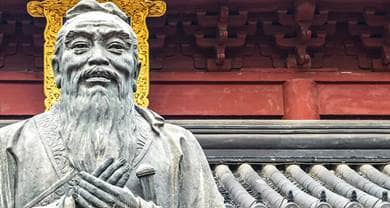- Trending:
- Pope Leo Xiv
- |
- Israel
- |
- Trump
- |
- Social Justice
- |
- Peace
- |
- Love

RELIGION LIBRARY
Confucianism
Confucianism's fortunes changed dramatically when the succeeding Han dynasty (206 B.C.E.-220 C.E.) adopted Confucian thought as a tool for legitimizing its power and controlling its subjects. In 136 B.C.E., the Han government established Confucian texts as the basis of its civil service examinations, making Confucian thought a mandatory subject for all who wished to obtain official employment. During this period, Confucian thought took on many recognizably religious aspects, including the ritual worship of Kongzi in state-sponsored temples.
The thinker most responsible for the shape of Han dynasty Confucianism was Dong Zhongshu (179-104 B.C.E.). He created a religious rationale for the authority and structure of the then-new imperial Chinese state, thus renewing a tradition of theological justification for dynastic power begun when the Western Zhou conquered the Shang in the 11th century B.C.E. According to Dong's interpretation of pre-Han chronicles, Tian could be observed working hand in hand with various human actors (typically virtuous rulers, moral ministers, and other Confucian exemplars) to keep the cosmos in balance by harmonizing its fundamental powers and processes. Many of Dong's ideas seem to have been drawn from Taoist traditions rather than the teachings associated with Kongzi and his disciples. When one reads Dong's description of the ideal ruler, it is not difficult to understand why Dong's interpretation won imperial support: "As for the one who appropriates the mean of Tian, Earth, and humankind and takes this as the thread that joins and connects them, if it is not one who acts as a king, then who can be equal to this task?"
For almost two millennia, Confucianism was sustained by the textual canon, educational institutions, and spiritual ethos developed by Dong and elaborated upon by his successors. Without Kongzi, there would be no Confucianism; but without Dong, there would be no Confucianism as it has been known for the past 2,000 years. Once Confucianism acquired government support, its teachings, texts, and traditions formed the basis not only of court ritual, bureaucratic procedure, and administrative ethos, but gradually of community and family life, as well. Confucianism both absorbed and countered influences from other religious traditions, especially Buddhism, and became well-established as the dominant worldview of Chinese elites.
Study Questions:
1. How did the political chaos of the "Spring and Autumn Period" affect the rise of Confucian thinking?
2. On what did Mengzi and Xunzi disagree?
3. What were the main rivals of early Confucianism?
4. What did Dong Zhongshu contribute to Confucian thought?










